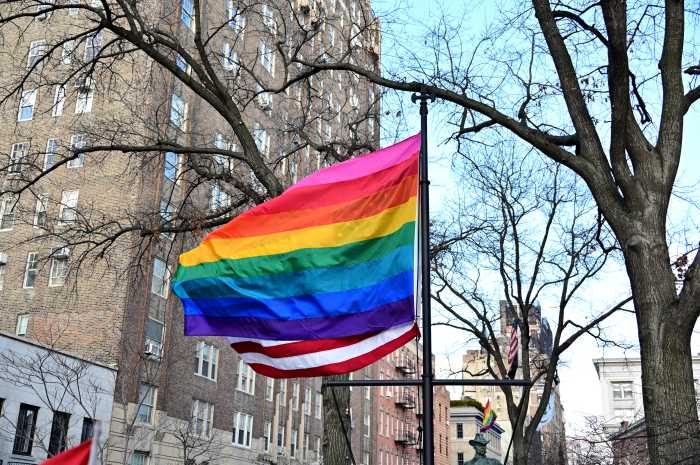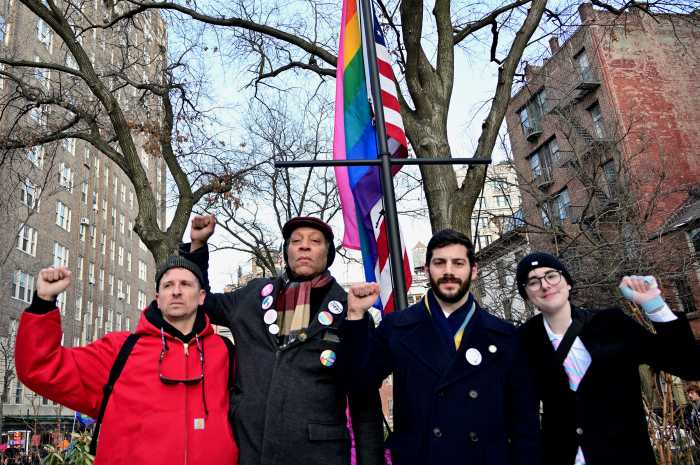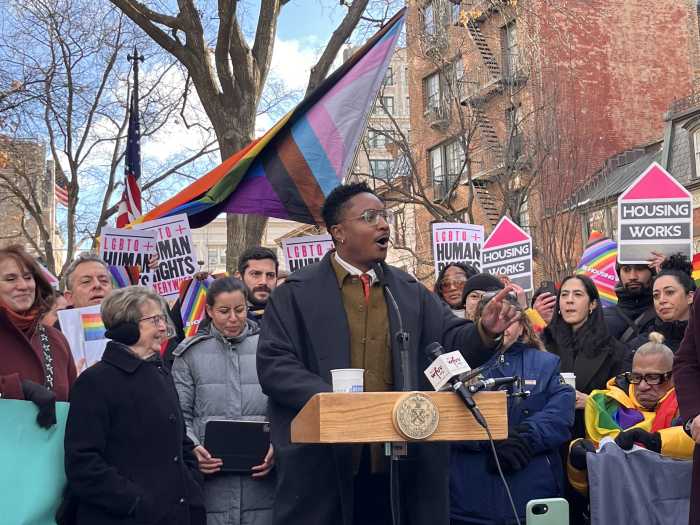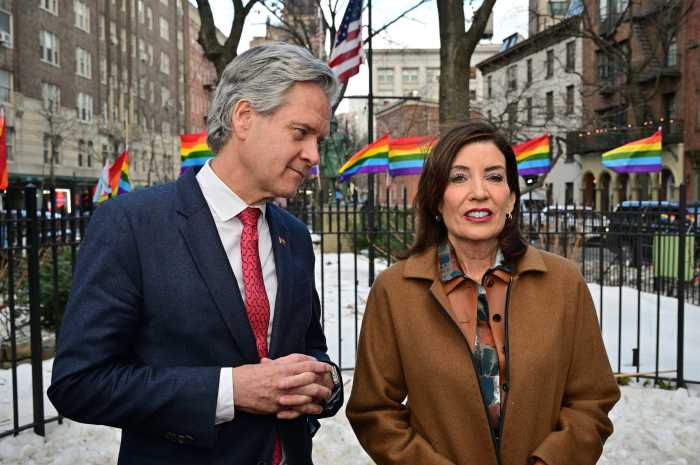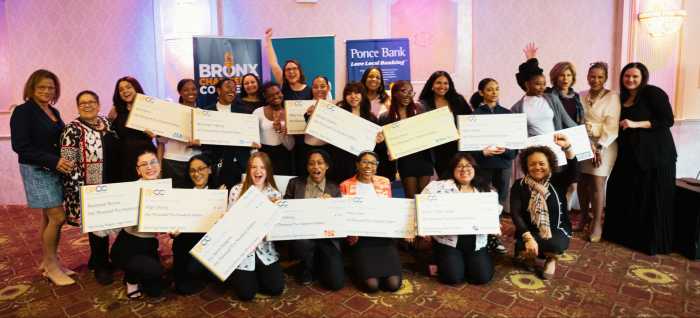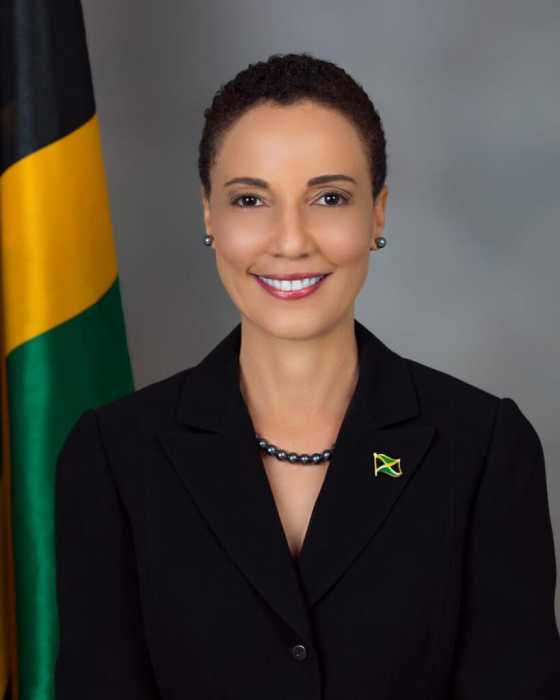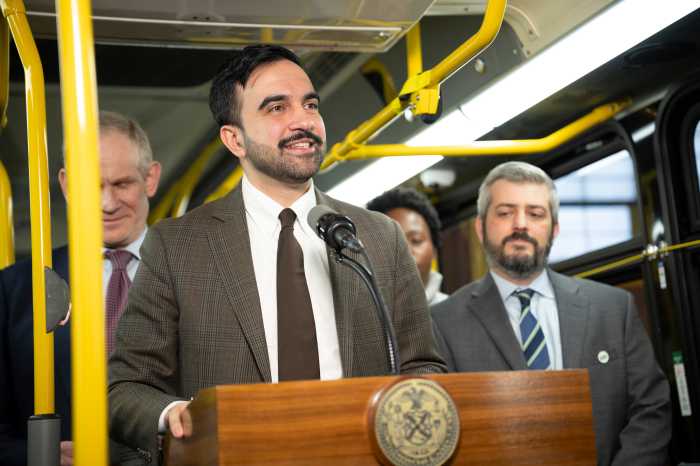A community’s civil rights unfold a squawk box away
The Minority Conference Room in the New York State Senate, where the 24 senators in the Democratic Caucus meet, is fittingly ornate, evocative of the gravitas I’ve always expected in a place of important political decision-making. Oxblood leather armchairs, massive chandeliers, and soaring burgundy drapes adorn this sanctum. It was here where a handful of other gay activists and I witnessed the historic debate, taking place in the equally ornate Senate chamber a corridor-length away, on the state’s Sexual Orientation Non Discrimination Act. In Albany to help the Empire State Pride Agenda in its final lobbying push, we were barred from the overflowing Senate gallery and raced downstairs through marble corridors to the caucus room, at the suggestion of ESPA’s Matt Foreman, who informed us that the room had a live audio feed. Senator David Paterson, the incoming Minority Leader, about to leave his office for the Senate chamber and the crucial vote, warmly greeted us, saying, “it’s important that you are here.” I located the audio feed, an old metal speaker, in a corner of the room, as the others filed into the room and we gathered in a loose circle of seats within earshot. After flicking a toggle switch atop the metal device, which looked more than anything else like an old toaster with side slats, discussion from the Senate floor was suddenly piped into our room. To a person, we remained mostly silent as the proceedings unfolded. We took no time to introduce ourselves, though I felt that the others shared my immediate sense of kinship. Only as the debate unfolded did I realize that I was sitting opposite Ronald Johnson, the associate executive director of Gay Men’s Health Crisis. Uninitiated as I am in the insular jargon of Albany, I was almost immediately thrown by the mention of the Senate’s SONDA bill number, S720, anticipating that it would be referred to by its Assembly number, A1971, which memorializes the year that gay rights was first introduced into the legislature. Throughout the morning, the buzz in the capitol building centered on whether the bill had yet garnered a simple majority. As the debate opened, we still didn’t know how the Republican Majority Leader, Joseph Bruno, was going to vote. Over the next hour or so, as various senators spoke, I considered their words in light of how Bruno might respond when he rose to speak. The debate, as it turned out, was rather perfunctory––even the words of our supporters seemed inadequate to the occasion. The Democrats spoke first and after some of his colleagues spoke in strong support of SONDA, Tom Duane introduced his transgender-inclusive amendment, in a speech alternately angry and expansive. In an informal vote, the effort unfortunately went down to defeat, and it was time for Bruno to take center stage. In a speech that was––well––frankly nonchalant, the Majority Leader, who for years had blocked consideration of the measure, threw his support behind the bill, wondering aloud what all the fuss was about but conceding he was willing to give “tolerance” the benefit of the doubt. “Well, if you feel so strongly about it, then I guess it’s important,” Bruno said, dismissing the struggle we face in our lives in a way that infuriated me. Senator Serphin Maltese, the Queens Republican, rose in opposition to the bill. He began innocuously enough, but as he continued I could not help but reflect on all those who had stood up before him to block the march of civil rights. If great events offer individual people an instant of denouement or spiritual clarification, then mine occurred as Maltese explicated his reasons for opposing the bill. I thought of my former career, as the dean of students at a large public high school in New York City, and a specific instance when a young man entered my office, bloodied and shaken, to inform me that he had just been assaulted and thrown down a flight of stairs. He’d been called “faggot,” and when I later apprehended the perpetrator, another student, that young man admitted that he had indeed beaten the gay man because “he was looking at me funny and I don’t like to be looked at that way.” Most likely, my facial expression conveyed my emotions at the immediate moment and at my recollection. Ronald Johnson gave me a look that seemed to acknowledge that he understood my feelings, and in that rarefied setting where we looked at one another because the only alternative was to look at the old metal speaker, I nodded my recognition. On the way down the Thruway heading back to the city that evening, we went over the day’s events, Timothy Spahl, who works at ESPA, and I reminiscing about our first loves back in high school. Tim shared how the torment he suffered at being taunted by his peers only abated when the high school football captain, with whom he became best friends, stepped up to put a stop to it. At times when the conversation in the car hit a lull, I recalled a recent conversation with Andres Duque of the Latino Commission on AIDS, who talked about how 81 percent of the new AIDS cases reported last year in New York City were men of African and Latino descent. He also talked to me about the murder of Eddie Garzon, a gay Colombian American, who died on September 6, 2001, three weeks after having his skull bludgeoned on a Queens street. Were Eddie white, and a resident of Manhattan, would his killer still be at large? I thought of my own neighborhood in the Bronx. Would SONDA protect a gay couple from harassment as they held hands walking down 231st Street’s commercial strip? Maybe my real question is whether I have the courage to hold my own boyfriend’s hand as we make our way from my apartment to the subway. I thought of a lesbian cop I know who shared with me how one night, cornered in an alleyway by criminals, her repeated 10-13 calls, “officer down,” went unheeded by her colleagues. The city was quiet on the evening of December 17 as we returned from Albany. In my own grandiose expectations, I expected church bells to be ringing across the Village and in Chelsea. After encountering quizzical expressions from a couple of acquaintances when I told them that I had been in Albany all that day, I stopped mentioning it. But I wouldn’t let go of the feeling I shared with a roomful of other gay, lesbian, and transgendered people earlier that day in Albany. When the victory tally was announced in the caucus room, we all rose and hugged one another. “Congratulations,” I told Ronald Johnson, and he congratulated me as well.

